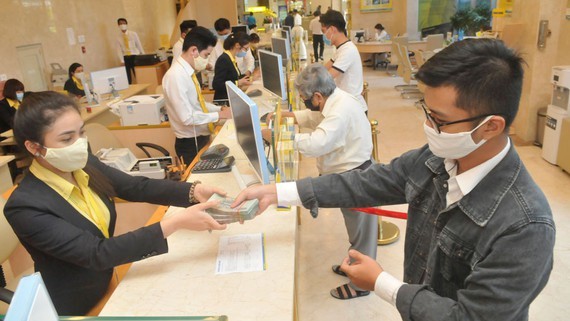
The end of this year is the deadline for commercial banks to list their shares on the stock trading floor. However, since the beginning of this year, due to the impacts of the Covid-19 pandemic, banking stocks sometime plunged to the lowest level in the past five years, making many banks continue to delay their listings. Some other banks have made plans to change the trading floor with expectations of increasing investment cash flow.
Although there are about six months left before the deadline for commercial banks to list and register for stock trading on the official market under the scheme "Restructuring the stock market and the insurance market until 2020 and orientation to 2025” approved by the Prime Minister at the end of February this year, more than a dozen commercial banks still have not listed on the floor. In 2019, many banks set the target of listing shares, but only VietBank officially listed shares on the UPCoM.
From the beginning of this year to now, the share listing plans of commercial banks have been very quiet, currently, many banks have changed their listing routes. Specifically, at the end of last year, MSB has submitted registration for listing 1,175 billion shares, equivalent to VND11.75 trillion of charter capital, on the Ho Chi Minh Stock Exchange (HoSE) with the stock code MSB, but this plan has been postponed.
At the annual general meeting of shareholders held in May this year, the Board of Directors of MSB submitted to shareholders the plan to revoke the first listing registration application at HoSE and decide the time to restart listing of shares at a favorable time. The leader of MSB explained that MSB had submitted the application at the end of last year, but it was probably due to the large volume of records, so its application could not be processed in time. In early 2020, the Covid-19 pandemic made the economy and banking industry, as well as enterprises on the trading floor, seriously affected. With the VN-Index continuously plummeting, up to 94 percent of banking shares fell, of which some fell by more than 30 percent of the market value, so MSB decided to postpone listing because of listing at the time would negatively affect the interests of shareholders. However, the Board of Directors also pledged to list this year, when the market is more favorable.
Similarly, at the general meeting of shareholders at the end of May, SCB also approved the plan to list on the UPCoM, SCB plans to officially list on the stock market after 2022 because according to the Board of Directors of this bank, at that time, there will be better conditions to "lock" foreign room when its financial capacity, as well as competitiveness, is stronger. As a result, SCB's listing plan will be about two years later than the time prescribed by the management agency. ABBank also planned to list shares on the HoSE, but at the general meeting of shareholders in June this year, ABBank also reported a change in the listing schedule due to the relocation of its head office from Ho Chi Minh City to Hanoi.
OCB and NamA Bank also had plans to list on the stock exchange two to three years ago but up to now, they still have missed the appointment because they are waiting for favorable conditions to benefit shareholders. OCB’s leader said that although there was a plan to list on the HoSE in early 2020, amid the context that the Covid-19 pandemic affected the market, so it could not be implemented.
Although there are about six months left before the deadline for commercial banks to list and register for stock trading on the official market under the scheme "Restructuring the stock market and the insurance market until 2020 and orientation to 2025” approved by the Prime Minister at the end of February this year, more than a dozen commercial banks still have not listed on the floor. In 2019, many banks set the target of listing shares, but only VietBank officially listed shares on the UPCoM.
From the beginning of this year to now, the share listing plans of commercial banks have been very quiet, currently, many banks have changed their listing routes. Specifically, at the end of last year, MSB has submitted registration for listing 1,175 billion shares, equivalent to VND11.75 trillion of charter capital, on the Ho Chi Minh Stock Exchange (HoSE) with the stock code MSB, but this plan has been postponed.
At the annual general meeting of shareholders held in May this year, the Board of Directors of MSB submitted to shareholders the plan to revoke the first listing registration application at HoSE and decide the time to restart listing of shares at a favorable time. The leader of MSB explained that MSB had submitted the application at the end of last year, but it was probably due to the large volume of records, so its application could not be processed in time. In early 2020, the Covid-19 pandemic made the economy and banking industry, as well as enterprises on the trading floor, seriously affected. With the VN-Index continuously plummeting, up to 94 percent of banking shares fell, of which some fell by more than 30 percent of the market value, so MSB decided to postpone listing because of listing at the time would negatively affect the interests of shareholders. However, the Board of Directors also pledged to list this year, when the market is more favorable.
Similarly, at the general meeting of shareholders at the end of May, SCB also approved the plan to list on the UPCoM, SCB plans to officially list on the stock market after 2022 because according to the Board of Directors of this bank, at that time, there will be better conditions to "lock" foreign room when its financial capacity, as well as competitiveness, is stronger. As a result, SCB's listing plan will be about two years later than the time prescribed by the management agency. ABBank also planned to list shares on the HoSE, but at the general meeting of shareholders in June this year, ABBank also reported a change in the listing schedule due to the relocation of its head office from Ho Chi Minh City to Hanoi.
OCB and NamA Bank also had plans to list on the stock exchange two to three years ago but up to now, they still have missed the appointment because they are waiting for favorable conditions to benefit shareholders. OCB’s leader said that although there was a plan to list on the HoSE in early 2020, amid the context that the Covid-19 pandemic affected the market, so it could not be implemented.
Statistics show that currently, there are only 18 out of 31 commercial banks in Vietnam listed on the stock trading floors.
The Decision No.32/2019 of the Prime Minister approving the scheme to establish the Vietnam Stock Exchange based on merging the HoSE and the Hanoi Stock Exchange (HNX), to unify the operation of the stock market. Accordingly, from 2020 to 2023, it is expected that the transferred stock market will be managed by the HoSE while bond and derivatives market will be managed by the HNX. Therefore, commercial banks listing shares on the HNX are now making plans to change the listing floor. Particularly, ACB and SHB have just submitted to shareholders and been approved the plan to change from HNX to HoSE.
Sharing about this decision, Mr. Do Minh Toan, General Director of ACB, said that changing the floor will help increase the market value of the stock and bring more benefits to shareholders. Because after changing the trading floor, ACB will likely be listed in the main basket of HoSE such as the VN30 with a proportion of about 4 percent, the VN Diamond with a proportion of 10 percent, VNFIN Lead with a proportion of 12 percent, and the VNFIN Select with a proportion of 12 percent. Regarding the route of changing the trading floor, according to Mr. Toan, ACB will pay dividends to increase its charter capital first which is expected to be implemented in September this year, then in November or December this year, the bank will switch floor.
SHB’s leader also said that the reason for changing the trading floor is to promote SHB's image to foreign strategic investors which are prestigious and large economic organizations, enhancing the position of SHB in the stock market. The specific time for changing the listing floor and the foreign ownership ratio have been proposed to be decided by the Board of Directors.
Besides, the plan to change the listing floor from UPCoM to HoSE in this year is expected to be approved by the Board of Directors of VIB and LienVietPostBank at the upcoming annual general meeting of shareholders. According to VIB's leader, although VIB shares have been sought by investors for many years, many organizations and large investment funds have not been able to put VIB in the portfolio because they are still listed on the UPCoM. VIB expects that after changing the floor, its shares will be added to the portfolio, thereby increasing the value of its stocks in the market. LienVietPostBank also said that changing listing is to enhance the image and brand identity in the domestic and international investor community; at the same time increasing the liquidity of stocks, bringing maximum benefits to shareholders.
























